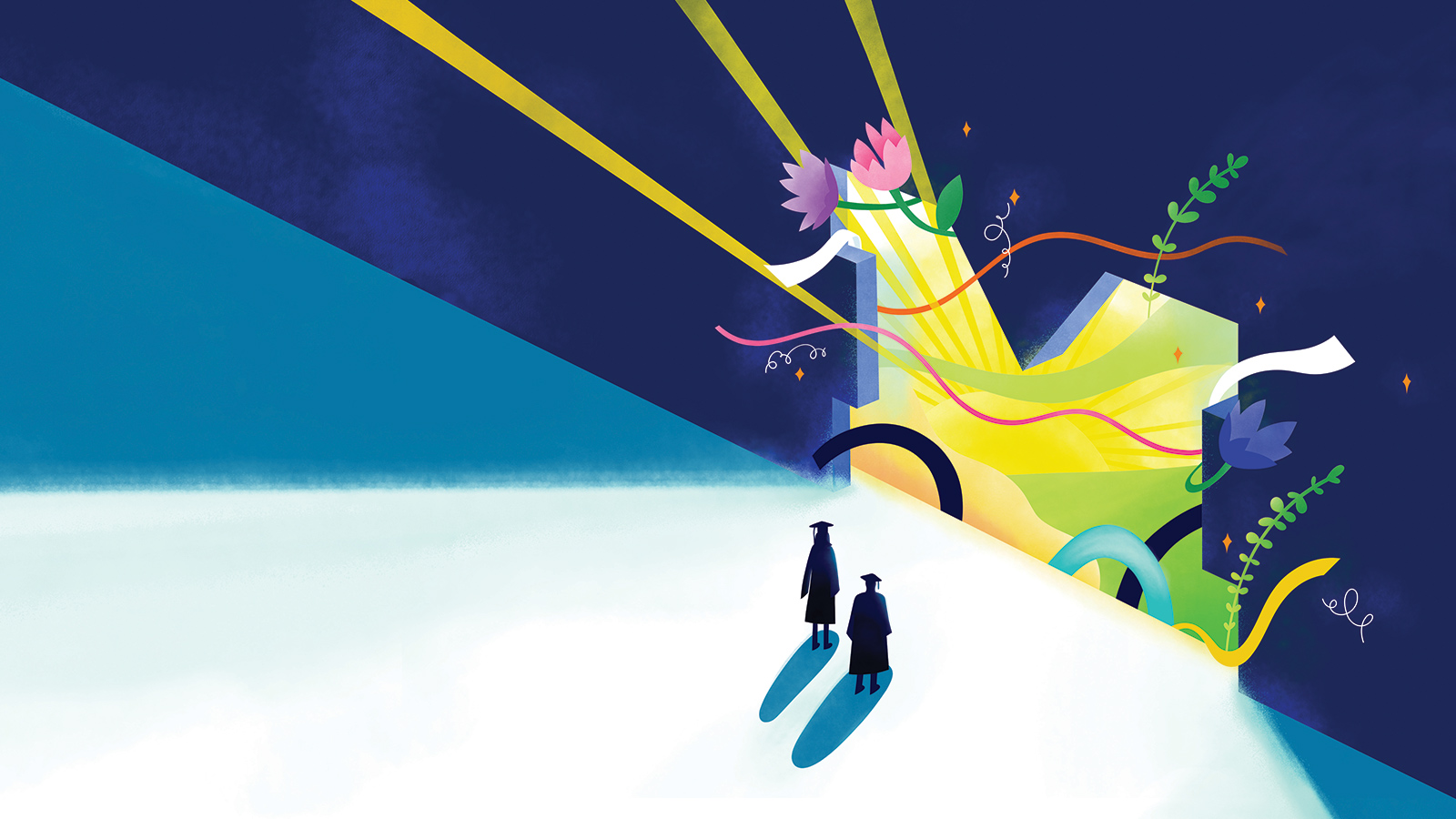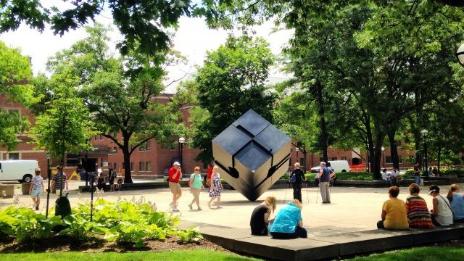By Madeline Swanson | Art by Adam Beeman | Photos by Marc-Grégor Campredon, Marsal Family School of Education
In a world rich with knowledge and possibilities, education stands as one of the most powerful keys to unlocking human potential. Education equips people with skills and experiences they can use to live up to their full capability, contribute to innovation, and make informed decisions.
“We have to have education if we hope to continue to thrive in this world,” according to Elizabeth Birr Moje, dean of the Marsal Family School of Education and George Herbert Mead Collegiate Professor of Education. “Education is all about justice. It's all about equity, and it's all about human thriving and flourishing.”
Access for all
It’s been said that while talent and ability may be evenly distributed across society, opportunity is not.
When educational opportunities are accessible to everyone, not only are individuals elevated, but also the entire community. For a life-changing education to be possible, students—regardless of their backgrounds—must have access to well-trained educators and environments that contribute to their success.
At U‑M, an entire ecosystem of resources is available to help students engage with the university and learn more about themselves and their passions.
From college readiness and financial assistance programs like Wolverine Pathways and the Go Blue Guarantee to the donors, students, faculty, and staff, U‑M and its partners are cultivating a campus community that inspires all students to succeed.
“Access leads to better research discoveries that really leverage U‑M’s breadth of expertise,” said Mike Solomon, dean of the Rackham Graduate School. “We need to not only create pathways so that students can see themselves here, but we also need to work with faculty so that a diverse group of students are admitted.”
Vital to a life-changing educational experience are a strong curriculum and well-trained teachers. And the research and work underway at the Marsal School is equipping the next generation of K-12 educators.
Preparing future educators at the Marsal School
At a time when K-12 education is experiencing a critical teacher shortage, equipping students with the tools to teach at the highest level—and the support they need in their early years in the profession—has never been more important to attracting and retaining quality educators.
“We know from research on the impact of teachers that a well-prepared teacher is the single most important ingredient in children's learning, over and above so many other things,” Moje said. “We know that physicians don't leave medical school knowing everything about how to practice medicine. That's why they do residencies. And that's true for teachers as well.”
And given that these shortages are prevalent in under-resourced communities, meeting the challenge is key to closing the gaps in equitable access to quality education. The Marsal School is preparing K-12 teachers as well as the professors who educate U‑M students using evidence-based models and methods.
Through programs like the Teach Blue Initiative and the Marygrove Learning Community: A P-20 Partnership in Detroit, the Marsal School is not only creating pipelines to a range of educational opportunities; it is also working to ensure novice teachers feel supported and inspired to continue their careers, even as they are also providing a high-quality education for Detroit children and youth.
“Continuous professional development,” Moje said, “is another way that we're working to make education equitable.”
A Michigan education for learners at all levels
The foundation for a successful undergraduate experience is often laid in a student’s first year.
As Vice Provost for Undergraduate Education Angela Dillard, who also serves as the Richard A. Meisler Collegiate Professor of Afroamerican and African Studies, notes, evidence shows that if students can complete 30 course credits by the end of their first year, they’re much more likely to graduate in four years.
“And that's not only important in terms of academic success, but it's also an affordability issue,” she said. “Being able to graduate in four years makes college more financially attainable for many families.”
This past summer, U‑M launched Early Momentum, which encourages students to register for and complete 30 credits by the end of their first year, regardless of how they choose to balance their course load.
“We're admitting a broader range of students with a broader range of backgrounds right now, and that means that the institution has to be prepared to support those students in being successful,” Dillard said.
This program, among many others, is aimed at closing equity gaps at the undergraduate level.
For students at Rackham, research and experiential learning is paramount to their academic experience and future careers. Solomon noted the school’s unique programs for career development puts Michigan in a position to educate students about opportunities to expand their careers.
“There's so much opportunity to use research and scholarship to solve societal problems that extend well beyond the academy,” Solomon said.
“The idea of an internship is quite common in the undergraduate space. But the idea that you would do that as part of research education is a much newer concept, and Michigan has really been at the forefront of making those types of opportunities available to students.”
From graduate-level internships and Ph.D. Connections Career Conferences that connect students with industry-leading alumni who have pursued novel career pathways outside of academia, to interdisciplinary community research projects and conducting experiments in labs across campus—and wraparound services to support students as they explore different pathways—Rackham is a leader in bringing unique opportunities to graduate students at all levels.
Supporting the whole student
For Martino Harmon, U‑M vice president for student life, these support systems and co-curricular experiences for students to fully engage in learning and self development beyond the classroom play a key role in a transformative educational experience.
“The University of Michigan is a large institution with many different opportunities and resources, and in a sense, students at the University of Michigan can make a large university small based on the experiences that they leverage and the resources that they connect to,” Harmon said. “You only grow and develop by the experiences that you have, and that requires exploration.”
Participating in a living-learning community, visiting physical spaces like the University of Michigan Museum of Art and William Monroe Trotter Multicultural Center that foster learning and inclusion, enjoying the recreation and well-being centers on campus, or attending a performance hosted by the University Musical Society are just some of the opportunities students have to learn and grow beyond traditional coursework.
Through the Well-being Collective—a collaborative effort focused on making U‑M a better place to live, work, and learn for students, faculty, and staff—students have access to more than 50 mental health and well-being resources and services. And at the Maize & Blue Cupboard, students experiencing food insecurity have access to free healthy food and household supplies.
Partnering for possibilities
Transforming the education landscape requires a collective effort, and partnership with donors is integral to U‑M’s success.
Beyond financial support, donors serve as thought leaders focused on amplifying U‑M’s impact on the world. For Moje, these partnerships have allowed her to push the boundaries of what a life-changing education means at Michigan.
“I find it so compelling to see how they help me think about things, how they push me,” Moje said. “You need the person who says, ‘Wow, this innovation is something no one has ever done before, and I trust that you're going to use these resources to the maximum benefit of society.’”
For Dillard, donors help build the ecosystem that supports students' holistic education in the classroom and beyond.
“It's the combination of things that the university and U‑M donors make possible for young people that's really extraordinary on a campus with this level of constant innovation and excitement,” she said. “Plus sports! What's not to love?”







